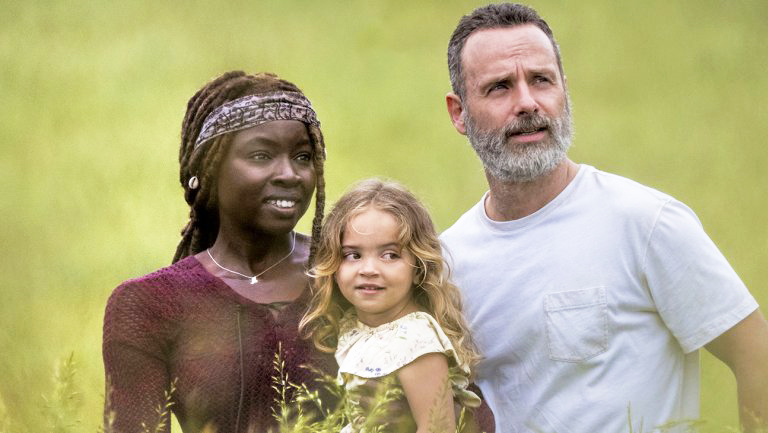
The following is a brief, spoiler-free preview of The Walking Dead season 9 premiere.
The Walking Dead returns this weekend with the ninth season premiere of the series, and there have been a number of changes, with still yet more to come. Foremost among the changes this season the fact that — for the first time in two-and-a-half years — Rick and company are no longer mired in the All-Out War. There’s also a new showrunner in Angela Kang, and a year-and-a-half time jump. More change is coming, too, in the departure of Rick Grimes (expected in the first half of the season), and at least the temporary absence of Maggie Green, who will not be appearing in the back half of the season.
In many ways, the time jump allows The Walking Dead an opportunity to reset. The five communities — The Kingdom, Alexandra, Oceanside, The Hilltop, and The Saviors — exist as something akin to states in the same country. There is a shot early in the episode of Michonne in a museum looking at a banner in a Civil War exhibit for a reason, but don’t expect season 9 of The Walking Dead to be a Civil War in the All-Out War sense of the things. It’s more like the Reconstruction Era, where four communities have to absorb the losing community, one that had been accustomed to a certain lifestyle (and, in a sense, slave labor) but has to learn to live with much less. There’s obviously still some lingering resentment.
In many ways, the season premiere portends a far more character driven season under the direction of Angela Kang. The war between the communities is not a physical one; it’s a political one with casualties. Rick and Michonne want to run Alexandra and the rest of the communities as a sort of democracy; the Saviors, in some respects, are a welfare state (living off of the goodwill of others), while The Hilltop — led by Maggie — is going through something of an identity crisis. They want to participate in Rick’s Democracy, but there’s also an obvious sense of resentment. Why should they give up any of their goods, supplies, or manpower to a community like the Saviors that tried to kill them? In the parlance of American Democracy, the Hilltop is a firm believer in state’s rights. Sure, let the Saviors survive, if you must, but why should we help them?
All of these political machinations are set against the backdrop of the old world’s deterioration. It’s no longer possible to scavenge the local grocery store for canned goods or Twinkies. All the gas within 100 miles has been used up. The bridges and roads are also falling apart, making it difficult to travel between the communities.
Rather than the end of civilization, after the time jump, it feels like the new beginning, but that obviously comes with its own host of problems. It’s no longer 10 people bandied together merely trying to survive. Those 10 people are now the leaders of the various communities, and when things don’t always go perfectly — there are still zombies in their midst, after all — the communities often blame their leaders.
In some ways, it’s much easier to be a leader during wartime than during peacetime (just ask Ulysses S. Grant), and that’s what season 9 of The Walking Dead is trying to tease out. What happens when the shift focuses from rallying the troops and killing a common enemy toward the logistics of feeding larger communities with a limited number of supplies?
That’s the task ahead for this season of The Walking Dead, and by its very nature, it will be more character driven than plot driven, and that is definitely to its credit. More importantly, it’s a show better built to last — with or without Rick Grimes and Maggie Green.






